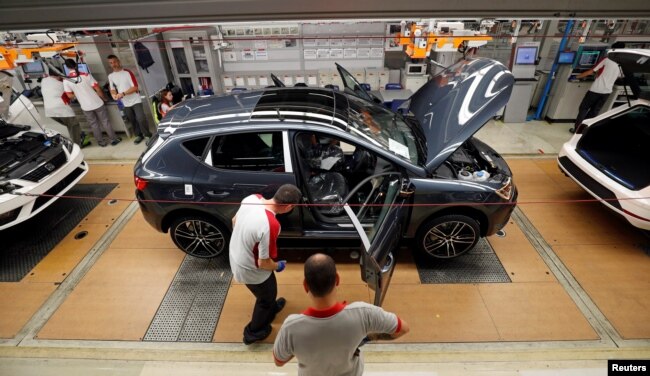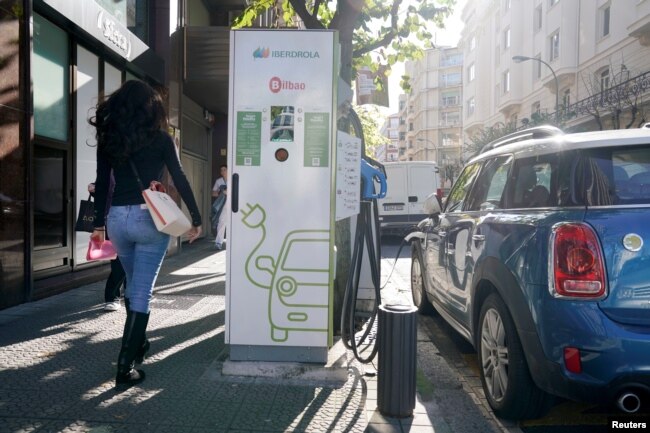Spain is drafting ambitious plans to switch its energy matrix to renewable sources and ban fossil fuel vehicles by 2040, according to a climate change law unveiled by socialist Prime Minister Pedro Sanchez last week, VOA news reports.
But some argue the initiative, which follows the lead of other European Union governments, may be too ambitious for a country whose car industry is ill-prepared for such a dramatic transformation.
Spain lags far behind other European nations in electric vehicle market share, with electric accounting for 0.22 percent of its market compared with about 2 percent in France, Belgium, Germany and the Netherlands.
Ill-timed measure
The measure could also be politically ill-timed, coinciding with mass protests in neighboring France that present a significant challenge to the year-old government of President Emmanuel Macron.
The protests in France are drawing right-leaning populists following a 6 percent increase in fuel taxes meant to discourage the use of diesel and gasoline. Hundreds were wounded and at least two people have killed in the past week during disturbances that progressive governments across Europe are nervously watching as they put their own green policies into effect.
Environmental concerns
The fervor to address global warming concerns and protect the environment spread vigorously to Spain. Sanchez, a leftist who took office this year, affirmed his commitment to fight climate change when he addressed the United Nations General Assembly in September.
Spain’s secretary of state for the environment, Hugo Moran, said this month the administration plans to work with municipal governments to facilitate “a transition towards emission-free mobility.”
“The country is facing a great challenge,” Moran said. “If we are not able to arrive on time we will miss the train.”
Auto industry concerns
But opponents, including Spanish automakers and labor unions, warn that forcing the elimination of fossil fuels could cause major social upheaval, large-scale unemployment and serious disruptions to the country’s rapidly growing automotive industry. Over the past decade Spain has grown into Europe’s second largest auto producer after Germany, and the sector accounts for nearly 10 percent of the country’s GDP.
A spokesman for Spain’s most powerful labor federation, the Workers’ Commissions, accused the government of mounting what its leaders say is an “inquisition” against fossil fuel vehicles.
All EU members have subscribed to the 2015 Paris agreement on climate change by which almost every nation in the world committed to reduce carbon emissions.
US Climate Report Says Disasters Will Get Worse
The U.S pulled out of the agreement under President Donald Trump, who decried what he said is its potentially negative impact on the American economy.
Major investment
European Union governments responded by working to enshrine the agreement in their laws, but the conversion is proving to be a challenge among member states that are less prepared in terms of economy and infrastructure.
Britain, France and Germany have each budgeted more than $1.1 billion to subsidize programs such as buybacks of fossil fuel vehicles, and invested in new infrastructure, including electric charging stations, and converting auto assembly plants.
The Spanish government has so far earmarked less than $86 million.
Under Sanchez, Spain this year established a new Ministry for Ecological Transition. Officials told reporters they are working to define a new system of tax incentives. The government, the officials said, eventually plans to devote 20 percent of the national budget to battle climate change.
Mario Armero, executive vice president of ANFAC, Spain’s largest association of car manufacturers, said in a television interview the government’s draft proposal this month came as a “surprise.” Spain, he said, is not prepared to provide the level of aid the auto industry would require to move away from fossil fuels.
Of the 31.6 million vehicles registered in Spain, fewer than 4,000 are electric, according to government statistics. Of the 2.8 million vehicles produced in the country last year, barely 0.33 percent had electric engines despite government efforts under way to promote their production.
Jobs on the line
According to ANFAC, 9 percent of Spain’s active labor force depends directly or indirectly on the auto industry, and switching to electrical cars could result in major layoffs, as their manufacture is less labor intensive and requires fewer parts.
Even medium-term goals of expanding the quota of electrical vehicles to 25 percent of the total produced could involve an 11 percent reduction in auto jobs, association officials say.
Unlike Germany or France, Spain’s car industry largely depends on foreign investors, including the U.S.-based Ford Motor Co., which shows few signs of moving to electric cars, according to industry analysts.
The new minister for Ecological Transition, Teresa Ribera, hopes to attract private sector support for the green initiatives.
“Our proposal sends clear and predictable signals to investors and financial agents on the model of decarbonized development where Spain is headed,” she said earlier this month.
Market analysts see signs of growing interest among private investors in the acquisition of Spain’s renewable energy assets.
But Lloyd Schultz, an American investment banker in Spain with Syntaxis Capital Límited, says that real growth in renewables is best achieved gradually through market incentives.
“Doing it by fiat risks generating a bubble”, he said.




